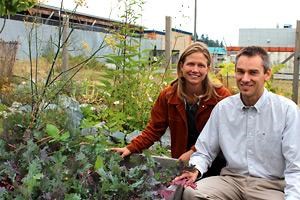Powell River Regional District directors have taken the first step toward establishing a program that separates organic material from the solid waste stream.
At the September 19 board meeting, directors voted in favour of a seven-step action plan recommended by the composting advisory committee, a group established in the fall of 2011 to evaluate the feasibility of a centralized composting facility for the region. The regional district contracted with a consultant, Net Zero Waste, to analyze the issue and work with the committee.
The committee’s recommendation was based on the consultant’s final report. It stated the first step in the process is determining if enough organic material can be collected in the region to make a composting facility viable. Since the majority of the population lives within City of Powell River boundaries, the consultant advised that the city should incorporate the collection of organic material in its curbside collection program.
The first step in the action plan calls for the regional district and the city to start discussions about the residential collection of source-separated organics within city boundaries. Residents would collect organic material in bins supplied by the regional district and the city would collect the material through its curbside collection program.
If the regional district and city reach an agreement, the next step in the plan is to initiate a community-wide education campaign to inform city residents of the new process and options for rural residents.
The third step in the action plan calls for the regional district to purchase collection bins through a request for proposals (RFP) process and distribute them to residents. RFPs would also be issued for the handling and hauling of the organic material and processing it at an existing composting facility.
The plan indicates contracts would be awarded in the fall of 2013, with municipal curbside pickup launching in 2014.
Electoral Area B Director Stan Gisborne expressed some concern about the plan, pointing out it only addresses collecting organic material in the city. “It doesn’t allow it for rural residents and they’re paying half of the cost,” he said.
Mac Fraser, who was still the regional district’s chief administrative officer, said the regional district would be paying for the purchase of the collection bins, to allow separation at the source. “What I understand from the composting advisory committee is that the viability hinges entirely on high volumes and successful screen separation in the city,” he said. “We don’t have the numbers by way of population in the rural areas.”
The regional district will have to go through all the steps in the action plan to determine whether the volume needed for a composting facility can ever be generated, Fraser explained. “It’s reasonable, but it’s going to take a great deal of individual property owners’ action in the city to generate the volume,” he said. “So, we have to spend a little money to let the separation happen and literally we’re going to have to see the volumes accumulated annually before we would move on a regional composting facility.”
If the city agrees to curbside collection of organic material, then the regional district would hire a contractor, through the RFP process, to handle and haul the organic material to its ultimate disposal location.
The plan is expected to reduce the cost of handling solid waste. Currently, the regional district contracts with Augusta Recycling Inc. to operate a transfer station and ship solid waste to Washington, which costs $162 a tonne.
The consultant estimated the cost could be reduced to $142 to $146 a tonne through reduced transportation and export fees.
The remaining steps of the action plan include monitoring how much organic material is collected annually and, if there is enough volume to justify the establishment of a local centralized composting facility, reviewing financial options of either the regional district or private enterprise in the construction and operation of a local facility.



